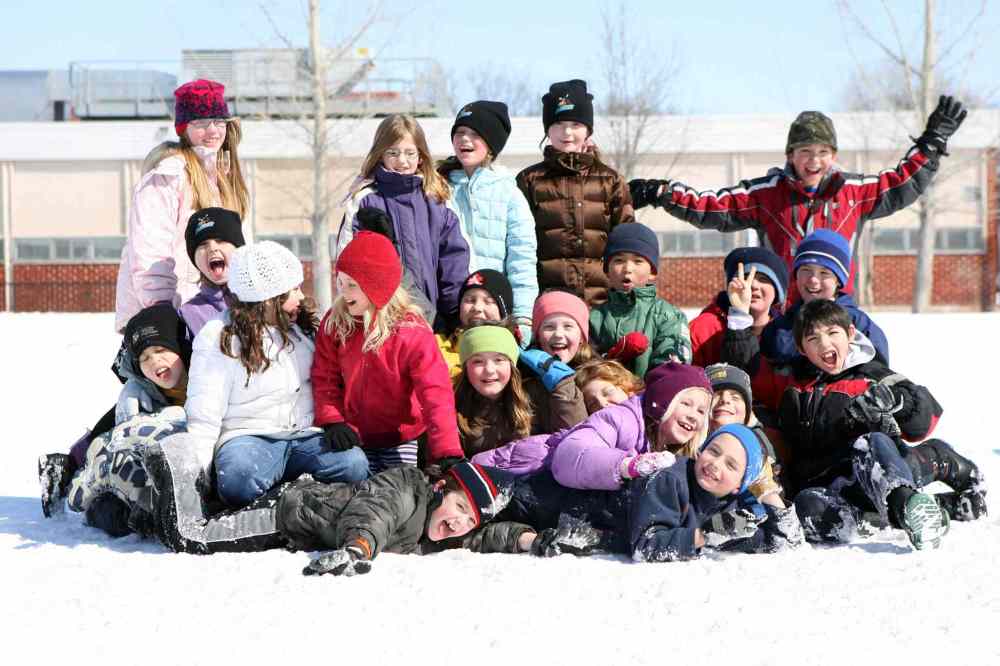Grade 3 finds us… in the middle of the maze
Advertisement
Read this article for free:
or
Already have an account? Log in here »
To continue reading, please subscribe:
Monthly Digital Subscription
$0 for the first 4 weeks*
- Enjoy unlimited reading on winnipegfreepress.com
- Read the E-Edition, our digital replica newspaper
- Access News Break, our award-winning app
- Play interactive puzzles
*No charge for 4 weeks then price increases to the regular rate of $19.00 plus GST every four weeks. Offer available to new and qualified returning subscribers only. Cancel any time.
Monthly Digital Subscription
$4.75/week*
- Enjoy unlimited reading on winnipegfreepress.com
- Read the E-Edition, our digital replica newspaper
- Access News Break, our award-winning app
- Play interactive puzzles
*Billed as $19 plus GST every four weeks. Cancel any time.
To continue reading, please subscribe:
Add Free Press access to your Brandon Sun subscription for only an additional
$1 for the first 4 weeks*
*Your next subscription payment will increase by $1.00 and you will be charged $16.99 plus GST for four weeks. After four weeks, your payment will increase to $23.99 plus GST every four weeks.
Read unlimited articles for free today:
or
Already have an account? Log in here »
Hey there, time traveller!
This article was published 13/04/2008 (6449 days ago), so information in it may no longer be current.
Carolin Vesely has kept in touch with Windsor School’s class of 2017 since they started kindergarten. When she and photographer Ruth Bonneville recently dropped in on the students, they were nearing the end of Grade 3.
Kindergarten is the baby trying to get its bearings, the scene-stealer whose every "first" is greeted with fanfare and applause.
Grade 6 is the eldest sibling who’s expected to uphold the rights and responsibilities that come with being the biggest and the strongest.
Grade 3, you might say, is the middle child in the elementary school family — too old to get by on cute, too young to rely on wits.
And that’s where we currently find the Class of 2017.
Welcome back to Windsor School and the continuing story of a group of students and their 12-year journey from playground to graduation podium.
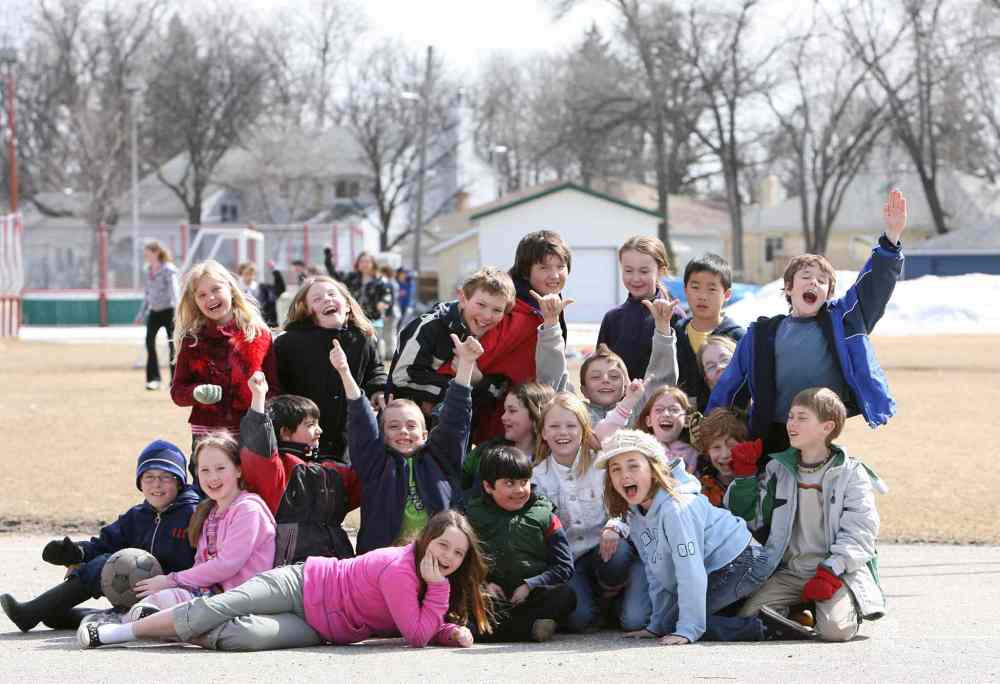
Being the middle fish in the little pond apparently has its perks.
"You can run free!" Savanna exclaims. (Most of her comments tend to be exclamatory in nature.)
Freedom, of course, is a relative concept.
A high school senior might say it lies beyond the podium, in the really big pond.
For Savanna and her classmates, it lies beyond the flagpole, in the really big playground.
"Grade 3 is funner," she says, "because you can go past the flag at recess."
Allow Hailey to explain further: "There’s the hard top, the play structure and the field. And then there’s a flagpole.
"They don’t let everyone go past there."
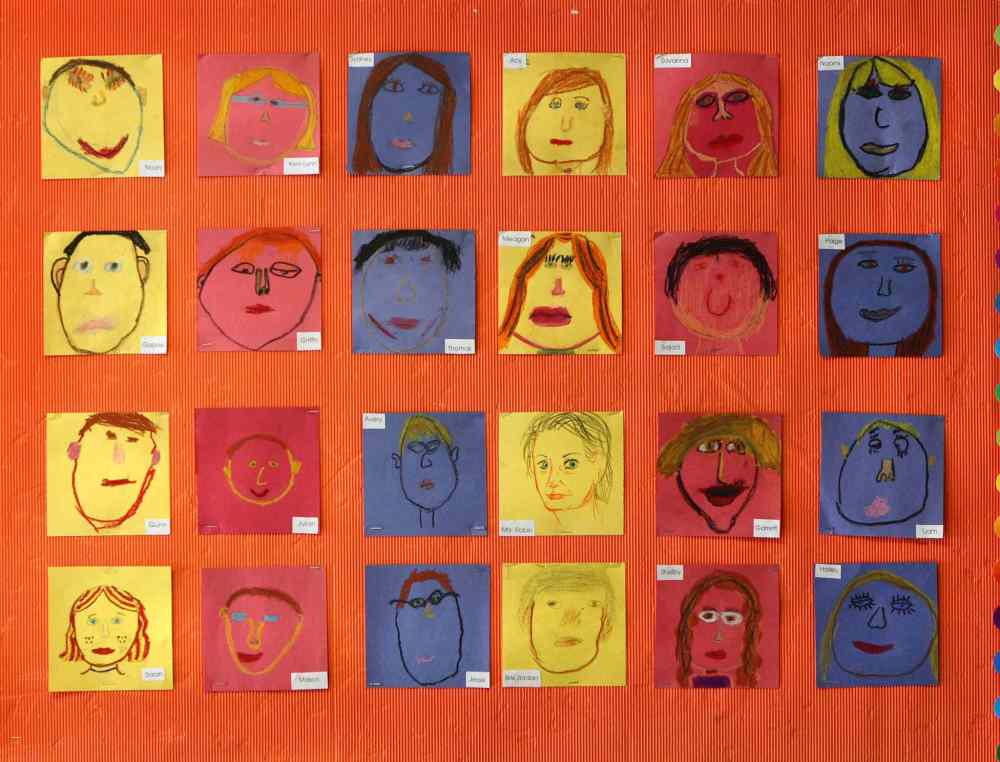
We’re talking a dozen or so extra metres of schoolyard turf here. And there’s still the forbidden zone farther afield that doesn’t relax its borders until Grade 4.
But when you’re trying to navigate your way through the maze of interconnected boundaries and gateways that is middle childhood, every step forward is significant.
When last we met, our young subjects were in the final weeks of Grade 2 — the entry point into the maze.
They’ll spend the next four or so years in there trying to find themselves and their place in the outside world. They’ll bump up against new comparisons and judgments as they learn to assess and accept their strengths and limitations. Friends will become increasingly important and they’ll create elaborate rituals and codes to foster those bonds.
Body strength and hand dexterity will improve and thinking will become more fluid and flexible.
Occasionally, they’ll wander off in daydreams and fantasies about the future, but concentration will steadily get better and last longer.
The latter was evident upon our arrival into Room No. 3.
What’s up, are some of the boys absent?
Nope, it’s a full house — 23 noses pressed into books. Sydney is reading Chicken Soup for the Kid’s Soul, while at a nearby table, Avery is well into Harry Potter and the Order of the Phoenix.
Funny, we don’t remember quiet reading time being this, well, quiet.
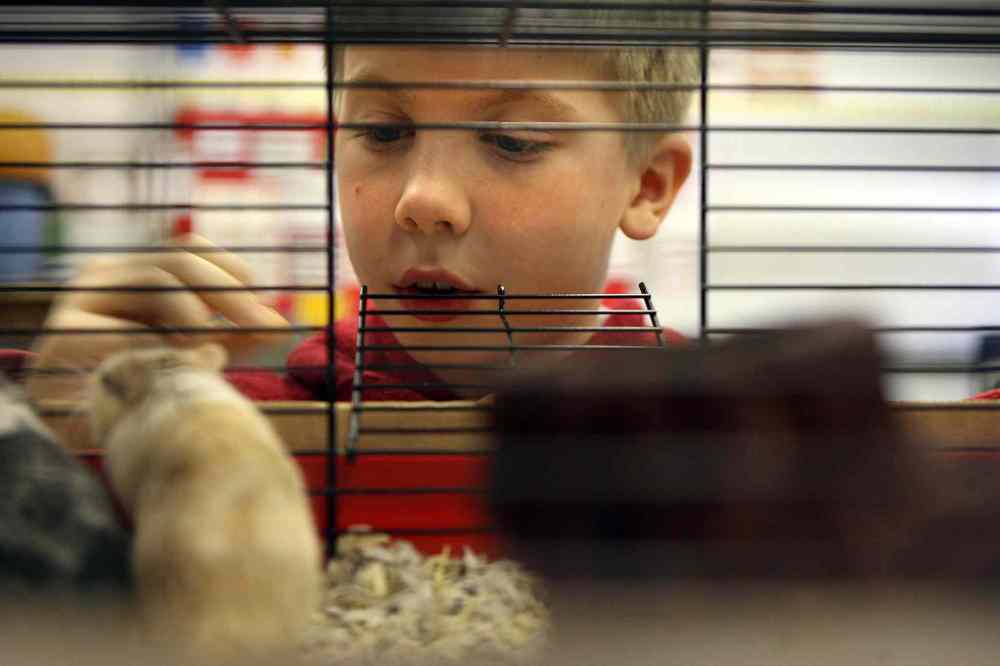
Then again, University of Manitoba developmental psychology professor Warren Eaton did say that although boys are generally more physically oriented and tend to have "trouble with activity modulation," this usually peaks at around age eight. (I’m hearing my name a lot more this year, not that "hey reporter" wasn’t an effective attention-getter.)
The span between ages 7 and 11 is considered the developmental bridge between dependence and approaching independence — kind of a training camp for adolescence.
It has also been called the Age of Mastery because this is when children are challenged by issues of performance and competence and place increased importance on achievement and gaining social acceptance.
In many ways, it’s also an age of enlightenment. Cognitively, our eight- and nine-year-olds are more capable of understanding the complex adult world and are growing increasingly aware of and interested in what the people on the outside of the maze are thinking and feeling — especially when it pertains to them.
"Do you remember me?" Gabriel asks by way of greeting when he spots us in Mrs. Robin’s classroom.
Let’s see . . . this is the kindergartner who vowed to quit school in Grade 4 to avoid the rumoured vaccination needles, the first-grader who suggested school be moved to the nighttime hours and the second-grader who dreamed of visiting China.
In Grade 3, the subject wants to interview the reporter.
What’s my favourite food? Movie? Book? Music? Where have I travelled? Do I believe in God? Go to church?
Last year around this time, these kids were learning to spell six-letter words and weaving them into simple stories. Now they’re writing (as in cursive handwriting) essays and books — complete with plot lines, character development, dialogue and illustrations — that get typed and bound by Mrs. Robin.
Gabriel and Aby are working on a class biography titled Our School. (Apparently, I get an entire chapter to myself.)
"We only got to stay for the morning, that was a bummer," they write in the opening chapter, Kindergarten.
On Grade 1: "We played a lot more games than we do now."
Grade 2: "There was lots of class parties and lots of candy."
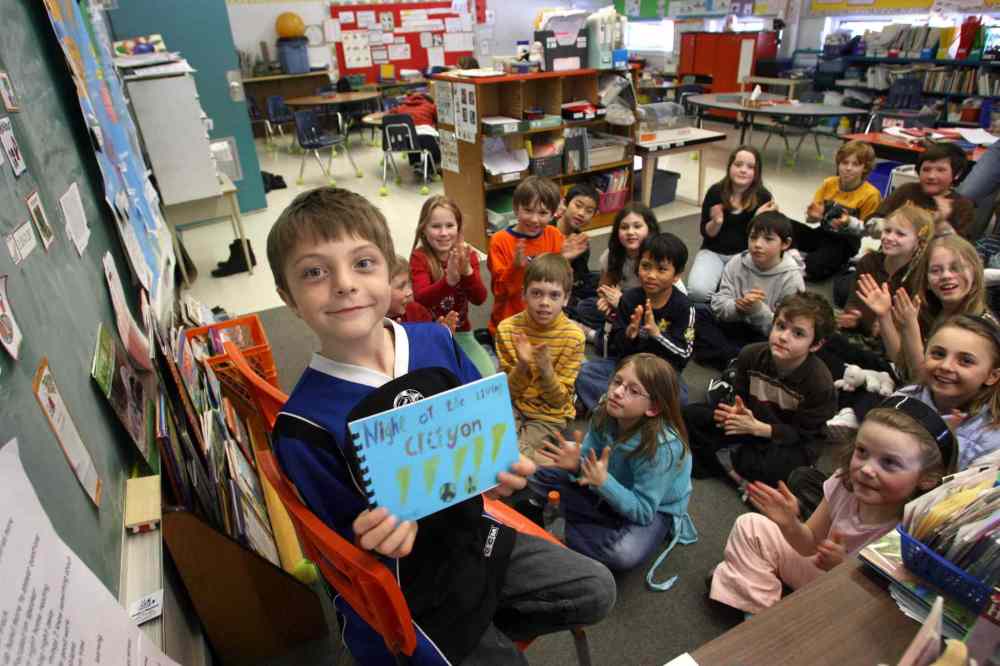
During Writer’s Workshop, we were also introduced to Griffin’s tale about a capuchin monkey who wants to be a stand-up comic, Mason’s "not really scary" Night of the Living Crayon and Noah’s saga about a Monster World inhabited by a "cowboy with a million eyes" and a family of tongues.
In Grade 3, you get to sit in the Author’s Chair and have your work reviewed by the critics. Except in this case, they’re your buddies and the feedback is called "stars and a wish" — two things you’ve done well and something to work on.
"It’s a bit of a peer-assessment time," says Sally Robin, Windsor’s Grade 3 teacher. "It informs me as to what the audience knows about the tools of writing."
A lot more than last year, if homophones and cinquains are any indication.
This year, in fact, the Class of 2017 became the Reading Buddies, literary mentors to the first-graders down the hall.
"It’s sort of hard," Garrett says, "because you have to pick books that they like. Grade 3 girls won’t like the same things as Grade 1 girls because they’ve grown out of princesses."
There’s "harder stuff" in math, too, according to Paige. "We’re working on times (multiplication)."
"We’re in the hundreds," Shelby adds.
Grade 3 has homework (Mrs. Robin uses a guideline of 10 minutes per grade) and jobs, such as delivering the attendance sheet to the office or feeding Caramel, Chocolate and Chip, the class gerbils. (Cage-cleaning duties are rotated among the Grade 4s.)
You have to change into shorts for gym and show-and-tell isn’t just for showing off; the thing you bring from home has to reflect something you’ve learned.
Gum chewing is allowed in class — occupational therapists have apparently found it helps with focus — but just half a piece and it has to stay inside your mouth at all times.
Water bottles are also permitted, provided they’re used for hydration and not for entertainment.
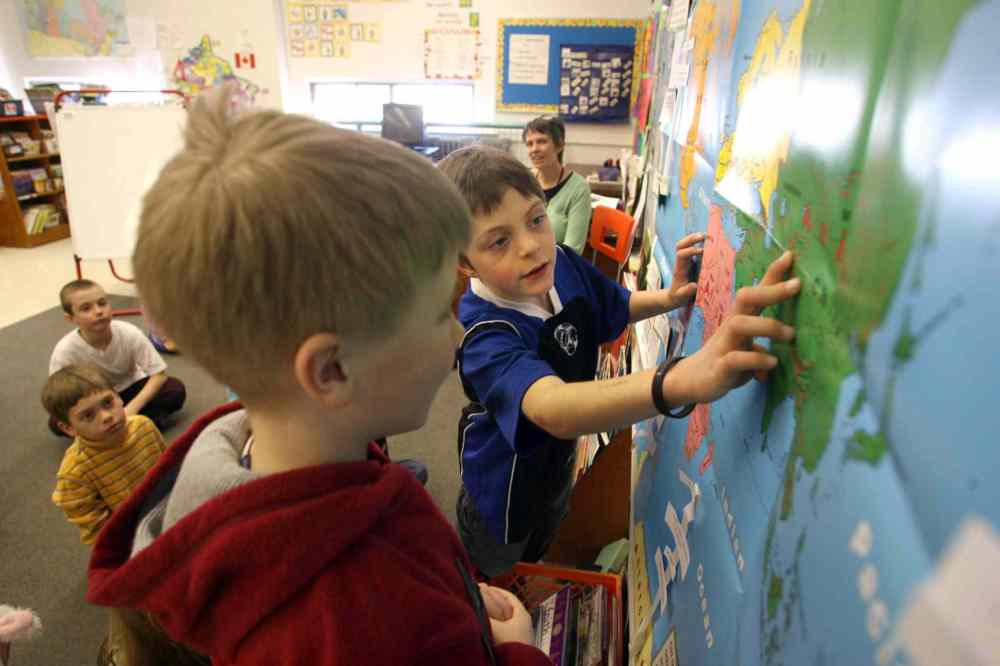
As the Class of 2017 is learning, privileges come with obligations — just like out here in the really big pond.
But unlike the world map at the front of the classroom, the maze of middle childhood doesn’t come with a legend to measure the real-life distance between important borders.
So when the teacher suddenly claps out a rhythm, it means stop whatever you’re doing, echo the clapping back and then listen for directions — just like in kindergarten.
Grade 3 might not be the baby, but it still needs a guiding hand.
Quinn’s take on his classmates:
"I have someting to show you," Quinn tells me. "I purposely did this story because I knew you were coming in. Mrs. Robin typed it for me.
"I knew most of this stuff, but I interviewed some people I was stumped on.
"I love writing.
"The hardest part is the spelling."
In their own words
On friendship
Meaghan: "We sometimes get into fights, just about things like ice cream flavours, but we make up. She always says sorry."
Aby: "She gives me the silent treatment."
What they learned in Conflict Resolution
Paige: "Some people think gossiping is funny but it’s not. You can’t judge people by their covers because they’re the same as everyone else."
Savanna: "Don’t start rumours about other people. It can get really mean and it’ll spread around the whole school and pretty soon everybody will hate the person."
Garrett: "Never jump on people’s legs. And if you do accidentally, say you’re sorry. "Revenge isn’t a good thing. You can really hurt somebody."
On the background music in Room No. 3
Julian (frowning): "Usually it’s romance."
Jesse: "I don’t like romance. Usually it means love and I don’t like love unless it’s my mom or my dad. Or my dog."
On chewing gum in class
Aby: "We break it in half — one piece in the morning and one in the afternoon. Sometimes people chew with their mouths open and that’s annoying."
On changing for gym
Shelby: "It’s annoying. It wastes time if you’re doing something fun."
On outside pursuits
Quinn: "Did you know I play the fiddle? I really want to play country music. Sometimes it’s so hard, I just wanna quit. My parents will say ‘OK, just leave it there and come back in an hour.’"
Mason: "School still stinks — and not like rotten eggs."
Garrett: "I don’t like school, but I like this class because you get to chew gum and have water bottles and play math games."
On future careers
Liam (wants to be a scientist): "I want to study the Earth, maybe find new sources of gas for cars."
Garrett: "My friends and me are going to start a movie club. We’d make our own video game system and DVDs. People would buy them, but if they didn’t like them, they could bring them back."
Advice for writing this feature
Liam: "I’d want you to explain the class good. I wouldn’t want you to just write ‘There are 23 kids in the class and there are more boys and they all like math.’ That would be boring."


